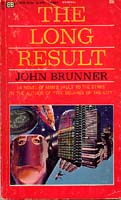 The
Long Result
The
Long Result
by John Brunner
A book review by Mark L. Olson
Ballantine Books 1966, $0.50, 190 pp
It's such a pity that Brunner tried to become a Serious Writer, since he once produced little gems like this. His "serious" writing will be justly forgotten, but, I fear, his good writing will also, since he never blossomed into the writer that he might have.
The Long Result is a straight-forward story set a few centuries from now in a world which seems to have solved most of its problems. Man has interstellar flight and two thriving colonies and has commerce with a half-dozen alien races in the vicinity. Humans are the only species with space travel.
Roald Vincent is a talented young man who works for Earth's diplomatic agency – the Cultural Affairs Bureau (it's a world without war) which deals both with the human colonies and the alien cultures. He's content to work quietly in the cultural affairs side of the operation because he's basically pretty lazy.
Events quicken as an aircraft carrying an important alien crashes and an anti-alien nut-group appears to have been responsible. Vincent winds up in charge of the investigation and ultimately ties it to the independence movement on one of Earth's two colony worlds, Starhome.
It's a quiet, uncomplicated story that proceeds in a straight-forward way, but does an extremely effective job of it. I thoroughly enjoyed it.
It's interesting that the novel also illustrates one of the classic failings of the political left, especially in the 60s: a belief that liberal democracy is at best inefficient and at worst a failure. In The Long Result, Earth is a liberal democracy, while Starhome is a tightly-organized, planned, rather authoritarian society. And naturally it's more efficient and is rapidly overhauling Earth – in fact, Earth's ceding of human leadership to Starhome is a central point in the book. Brunner was a leftie his whole life and here he lets the left's infatuation with authoritarian government show.
But that's a minor complaint about an otherwise enjoyable book.
Part of the simplicity of the story comes from a rigorous avoidance of extraneous detail. Brunner includes enough about Roald Vincent, the Cultural Bureau he works for, and their world to create the impression of a fascinating milieu, but he spends no time or words developing the background further than needed for the story. (This is, of course, entirely typical of SF of the time and is a large part of the reason that novels were typically 160 pages in 1960 rather than the 460 pages usual today. I'm only half-convinced that it detracted from the SF.)
This leaves Brunner forced to create some highly unrealistic situations. He doesn't want the Cultural bureau to be too big and bureaucratic – he wants Vincent to report directly to the Chief of Bureau, and to have only a few subordinates – because Vincent has to be both highly-placed within the Bureau and doing hands-on work, otherwise the story would not go. (Another writer might have had a more realistically-sized Bureau (huge) and either had Vincent be a lowly analyst who gets caught up in implausibly large affairs, or the manager of a huge department within it who goes off to deal with things on his own. Neither are noticeably more realistic that what Brunner chose.)
So Brunner's Cultural Bureau appears to be the main contact between Earth's government and the stars, but it has no more than 50-100 people. Ah, well.
Still, a fine, fun story.
NESFA homepage | Review Index | More Reviews by Mark L. Olson
